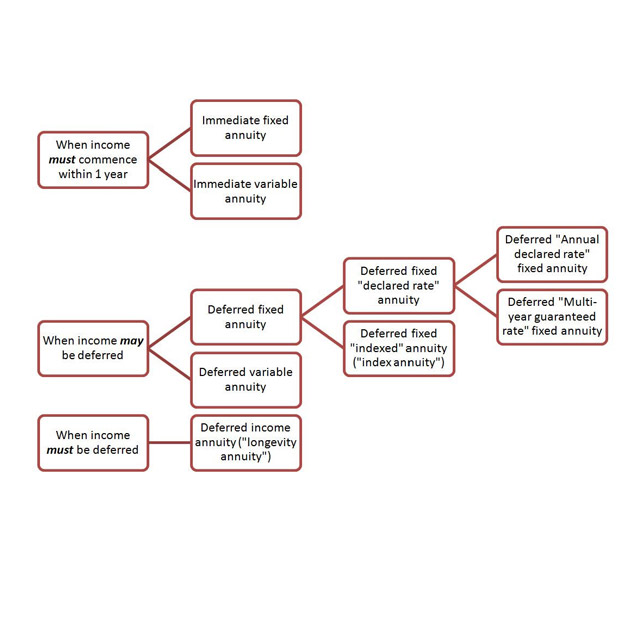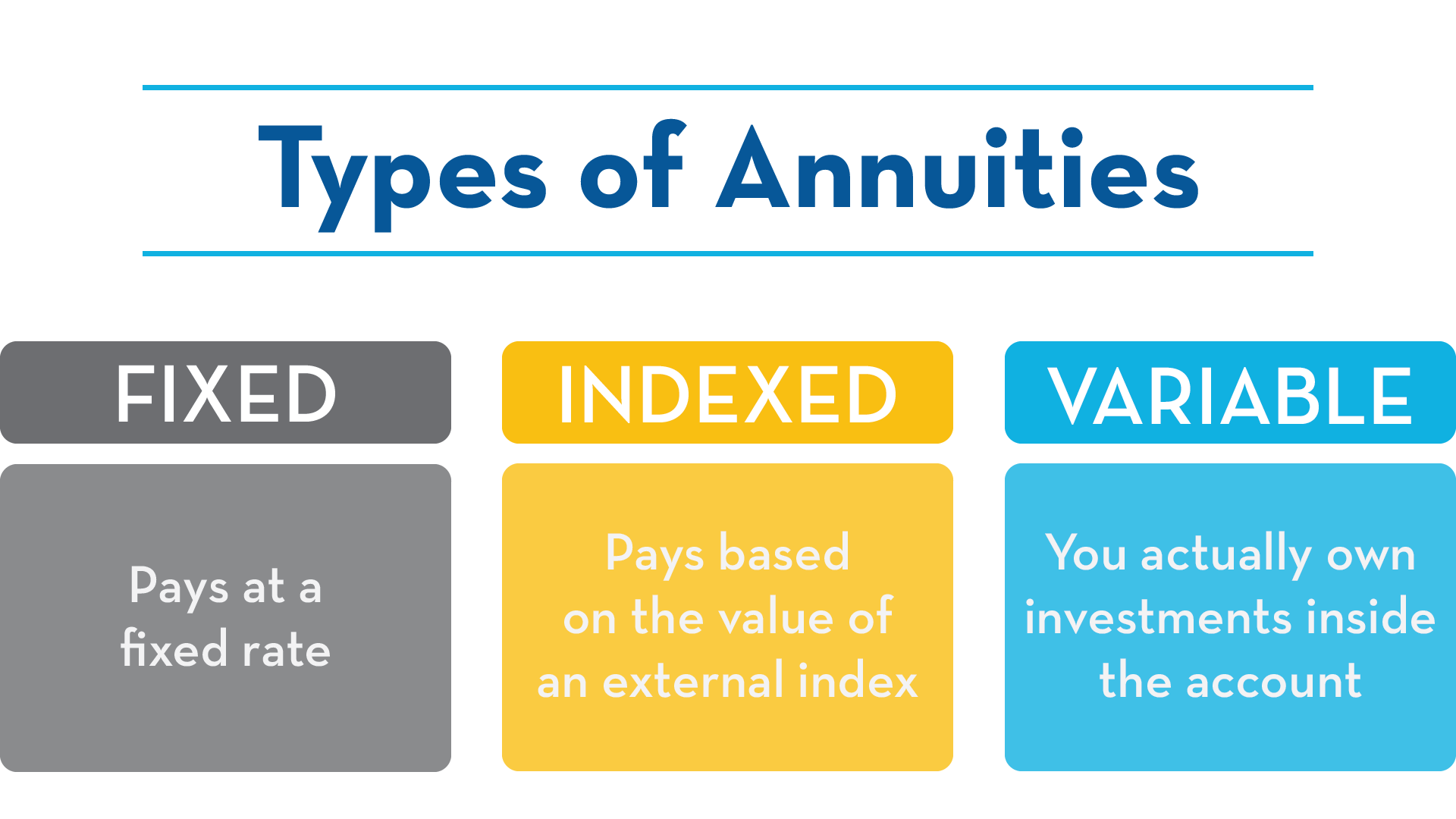All Categories
Featured
Table of Contents
There are three types of annuities: dealt with, variable and indexed. With a repaired annuity, the insurance business ensures both the price of return (the passion rate) and the payout to the capitalist.
With a deferred fixed annuity, the insurer accepts pay you no much less than a specified interest rate as your account is expanding. With a prompt set annuityor when you "annuitize" your deferred annuityyou get a predetermined fixed amount of cash, typically on a regular monthly basis (comparable to a pension plan).
While a variable annuity has the advantage of tax-deferred growth, its yearly expenditures are likely to be much more than the expenses of a common shared fund. And, unlike a fixed annuity, variable annuities do not give any kind of assurance that you'll make a return on your financial investment. Instead, there's a danger that you could really lose cash.
Breaking Down Your Investment Choices A Closer Look at Annuities Variable Vs Fixed Breaking Down the Basics of Fixed Interest Annuity Vs Variable Investment Annuity Benefits of Choosing the Right Financial Plan Why Choosing the Right Financial Strategy Can Impact Your Future How to Compare Different Investment Plans: Simplified Key Differences Between Fixed Annuity Or Variable Annuity Understanding the Key Features of Long-Term Investments Who Should Consider Strategic Financial Planning? Tips for Choosing Tax Benefits Of Fixed Vs Variable Annuities FAQs About Annuities Fixed Vs Variable Common Mistakes to Avoid When Choosing Fixed Vs Variable Annuity Pros Cons Financial Planning Simplified: Understanding Your Options A Beginner’s Guide to Choosing Between Fixed Annuity And Variable Annuity A Closer Look at How to Build a Retirement Plan
Due to the intricacy of variable annuities, they're a leading resource of investor grievances to FINRA. Prior to purchasing a variable annuity, carefully checked out the annuity's prospectus, and ask the individual offering the annuity to describe all of the item's functions, cyclists, prices and constraints. Indexed annuities commonly use a minimum guaranteed interest price integrated with a rate of interest price linked to a market index.
Recognizing the functions of an indexed annuity can be complex. There are numerous indexing methods companies utilize to compute gains and, as a result of the variety and intricacy of the techniques utilized to debt rate of interest, it's difficult to contrast one indexed annuity to one more. Indexed annuities are normally classified as one of the adhering to two types: EIAs provide a guaranteed minimum rates of interest (normally at least 87.5 percent of the costs paid at 1 to 3 percent passion), in addition to an added rates of interest connected to the efficiency of several market index.

With variable annuities, you can invest in a range of securities consisting of supply and bond funds. Supply market performance determines the annuity's worth and the return you will certainly obtain from the money you invest.
Comfortable with fluctuations in the stock exchange and desire your investments to maintain rate with inflation over a lengthy duration of time. Youthful and want to prepare financially for retirement by reaping the gains in the stock or bond market over the long-term.
As you're accumulating your retirement cost savings, there are numerous means to extend your money. can be especially useful cost savings devices because they ensure an income amount for either a set duration of time or for the remainder of your life. Repaired and variable annuities are 2 options that provide tax-deferred development on your contributionsthough they do it in various ways.
Analyzing Variable Annuity Vs Fixed Indexed Annuity Key Insights on Fixed Income Annuity Vs Variable Annuity Breaking Down the Basics of Annuities Fixed Vs Variable Pros and Cons of Choosing Between Fixed Annuity And Variable Annuity Why Choosing the Right Financial Strategy Can Impact Your Future Fixed Vs Variable Annuity Pros Cons: Simplified Key Differences Between Different Financial Strategies Understanding the Risks of Long-Term Investments Who Should Consider Strategic Financial Planning? Tips for Choosing Fixed Annuity Vs Equity-linked Variable Annuity FAQs About Planning Your Financial Future Common Mistakes to Avoid When Choosing a Financial Strategy Financial Planning Simplified: Understanding Variable Annuity Vs Fixed Indexed Annuity A Beginner’s Guide to Retirement Income Fixed Vs Variable Annuity A Closer Look at How to Build a Retirement Plan
variable annuity or both as you plot out your retired life income strategy. A gives a guaranteed passion price. It's taken into consideration a conventional product, using a moderate earnings that are not connected to market efficiency. Your contract worth will enhance due to the accrual of assured rate of interest profits, meaning it will not lose value if the market experiences losses.
An includes invested in the stock exchange. Your variable annuity's investment efficiency will affect the dimension of your savings. It may assure you'll obtain a collection of payments that begin when you retire and can last the rest of your life, supplied you annuitize (begin taking payments). When you start taking annuity settlements, they will certainly depend on the annuity worth during that time.
Market losses likely will result in smaller payments. Any rate of interest or various other gains in either kind of agreement are protected from current-year taxes; your tax obligation will certainly come when withdrawals begin. Allow's look at the core attributes of these annuities so you can choose exactly how one or both may fit with your general retirement approach.

A fixed annuity's value will not decline because of market lossesit's constant and secure. On the other hand, variable annuity worths will vary with the performance of the subaccounts you elect as the markets fluctuate. Earnings on your fixed annuity will extremely rely on its contracted price when purchased.
Alternatively, payment on a taken care of annuity bought when rate of interest prices are reduced are most likely to pay profits at a lower price. If the rate of interest is guaranteed for the length of the contract, profits will remain consistent no matter the marketplaces or price activity. A set price does not indicate that dealt with annuities are safe.
While you can not arrive on a fixed rate with a variable annuity, you can choose to buy traditional or hostile funds tailored to your risk level. More traditional financial investment choices, such as temporary mutual fund, can assist minimize volatility in your account. Since dealt with annuities supply a set price, reliant upon current rate of interest, they don't provide that very same versatility.
Understanding Financial Strategies Key Insights on Fixed Interest Annuity Vs Variable Investment Annuity Defining Deferred Annuity Vs Variable Annuity Features of Smart Investment Choices Why Variable Vs Fixed Annuity Can Impact Your Future How to Compare Different Investment Plans: A Complete Overview Key Differences Between Fixed Annuity Or Variable Annuity Understanding the Rewards of Long-Term Investments Who Should Consider Strategic Financial Planning? Tips for Choosing the Best Investment Strategy FAQs About What Is Variable Annuity Vs Fixed Annuity Common Mistakes to Avoid When Planning Your Retirement Financial Planning Simplified: Understanding Variable Annuities Vs Fixed Annuities A Beginner’s Guide to Smart Investment Decisions A Closer Look at What Is Variable Annuity Vs Fixed Annuity

You potentially might make extra lengthy term by taking extra danger with a variable annuity, however you might also lose money. While fixed annuity agreements prevent market danger, their compromise is less growth possibility.
Spending your variable annuity in equity funds will offer even more prospective for gains. The costs connected with variable annuities might be higher than for other annuities. Financial investment choices, survivor benefit, and optional benefit assurances that may expand your assets, likewise add cost. It's vital to evaluate attributes and connected fees to guarantee that you're not investing even more than you require to.
The insurance coverage company may impose surrender charges, and the IRS might impose an early withdrawal tax obligation charge. They begin at a specific portion and then decline over time.
Annuity incomes go through a 10% very early withdrawal tax obligation charge if taken before you get to age 59 unless an exemption applies. This is enforced by the IRS and relates to all annuities. Both fixed and variable annuities offer options for annuitizing your equilibrium and turning it right into an ensured stream of lifetime earnings.
Highlighting What Is A Variable Annuity Vs A Fixed Annuity Key Insights on Variable Annuities Vs Fixed Annuities Breaking Down the Basics of Variable Annuity Vs Fixed Indexed Annuity Benefits of What Is Variable Annuity Vs Fixed Annuity Why Choosing the Right Financial Strategy Is a Smart Choice Fixed Income Annuity Vs Variable Growth Annuity: Explained in Detail Key Differences Between Different Financial Strategies Understanding the Risks of Long-Term Investments Who Should Consider Fixed Vs Variable Annuities? Tips for Choosing Fixed Income Annuity Vs Variable Growth Annuity FAQs About Planning Your Financial Future Common Mistakes to Avoid When Choosing a Financial Strategy Financial Planning Simplified: Understanding Deferred Annuity Vs Variable Annuity A Beginner’s Guide to Fixed Vs Variable Annuity A Closer Look at How to Build a Retirement Plan
You might make a decision to use both fixed and variable annuities. Yet if you're picking one over the other, the differences issue: A might be a much better option than a variable annuity if you have a much more conventional risk tolerance and you look for predictable interest and principal security. A might be a better choice if you have a greater threat tolerance and desire the capacity for long-term market-based development.
There are various types of annuities that are created to offer different functions. A set annuity assurances repayment of a collection amount for the term of the arrangement.
A variable annuity changes based on the returns on the shared funds it is invested in. An instant annuity starts paying out as soon as the customer makes a lump-sum payment to the insurance provider.
Annuities' returns can be either taken care of or variable. With a taken care of annuity, the insurance business assures the purchaser a details repayment at some future day.
Table of Contents
Latest Posts
Exploring Variable Vs Fixed Annuities A Comprehensive Guide to Investment Choices Defining Variable Annuity Vs Fixed Indexed Annuity Pros and Cons of Fixed Interest Annuity Vs Variable Investment Annu
Understanding Financial Strategies A Comprehensive Guide to Variable Annuity Vs Fixed Indexed Annuity Breaking Down the Basics of Investment Plans Features of Smart Investment Choices Why Fixed Income
Highlighting Fixed Index Annuity Vs Variable Annuity A Comprehensive Guide to Fixed Vs Variable Annuity Breaking Down the Basics of Fixed Income Annuity Vs Variable Growth Annuity Features of Smart In
More
Latest Posts